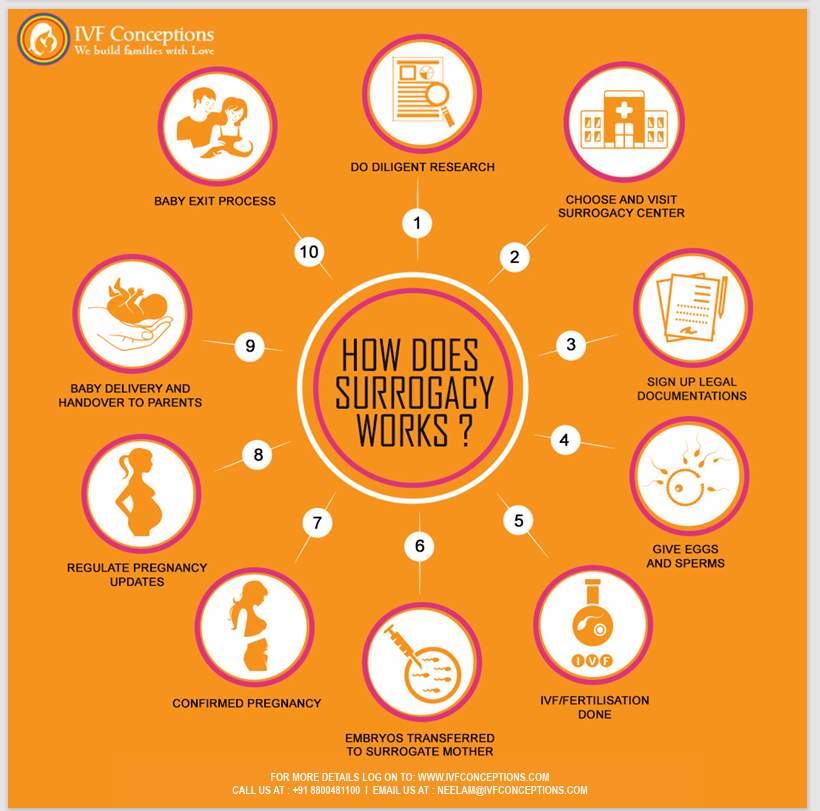When to Choose Surrogacy Process: A Guide
Surrogacy is becoming a popular way to start a family, however, this long and complex process needs huge emotional, financial, legal, and logistic investment. That is why, surrogacy is not for all intended parents and for some infertile couples or single male or gay couples, this is the only option to grow their family. You need to think about legal, financial, and emotional aspects. This guide will help you decide if surrogacy is right for your family.
- Book an online appointment: Get a free online consultation.
- Call\W:+91-8800481100 Email:neelam@ivfconceptions.com
Key Takeaways
- Surrogacy is a big decision that needs careful thought and planning.
- It’s important to know the different types of surrogacy and why people choose it.
- The process includes steps like making embryos and dealing with legal issues.
- Things like surrogacy costs, laws, and requirements can affect your decision.
- Looking at success rates and guidelines can help you make a well-informed choice.
Additional resources to Read:
Important Questions to Ask a Surrogacy Agency
Disqualifications for Surrogacy – What You Need to Know
Is Surrogacy Covered by Insurance? Your Guide to Coverage
How Much Does a Surrogate Cost – Key Details Explained
Understanding Surrogacy: Types and Reasons
Surrogacy is when a woman carries and delivers a baby for another person or couple. It helps those who can’t have a child on their own become biological parents. There are two main types: traditional and gestational surrogacy.
Traditional Surrogacy vs. Gestational Surrogacy
In traditional surrogacy, the surrogate uses her own egg, which is fertilized by sperm from the intended father or a donor. This means the surrogate is related to the child by blood. Gestational surrogacy uses the intended parents’ or donors’ sperm and egg, then puts the embryo in the surrogate’s uterus. The surrogate is not related to the child by blood in this type.

Common Reasons to Consider Surrogacy
So, When to Choose the Surrogacy Process?
- Medical conditions that make pregnancy risky or impossible, such as a missing or damaged uterus or other reproductive health issues.
- Being a single male or a same-sex male couple who desires to have a child biologically related to one or both partners.
- Being a transgender individual or couple who want to have a child biologically related to one or both partners.
Surrogacy lets those who can’t have or carry a child themselves experience the joy of biological parenthood. It’s a complex process with legal and emotional aspects. Yet, for many, it’s a life-changing way to grow their family.
| Characteristic | Traditional Surrogacy | Gestational Surrogacy |
| Genetic Relationship | Surrogate is genetically related to the child | Surrogate is not genetically related to the child |
| Egg Source | Surrogate’s own egg | Intended mother’s or donor’s egg |
| Sperm Source | Intended father’s or donor’s sperm | Intended father’s or donor’s sperm |
| Legal Complexity | More legally complex due to the genetic link | Less legally complex as the surrogate has no genetic tie to the child |
“Surrogacy provides an opportunity for those who cannot conceive or carry a child themselves to experience the joys of biological parenthood.”
Surrogacy can be a good option for those facing challenges in becoming parents. Knowing the types and reasons for surrogacy helps in deciding if it’s right for you.
The Surrogacy Process: Step-by-Step Guide
The surrogacy process is exciting and rewarding but has many steps. Let’s look at the key stages you’ll go through to become parents through surrogacy.

Step 1: Creating Embryos
The first step is to create embryos through in vitro fertilization (IVF). This might include testing the embryos before implantation to check their health. After the embryos are ready, finding a good surrogate is the next step.
Step 2: Finding a Surrogate
Finding and checking potential surrogates is key. You can look for one on your own or use a surrogacy agency for help. Surrogates go through a detailed medical and mental check to make sure they’re ready for the journey.
Step 3: Matching With Your Surrogate
After picking a surrogate, you start matching. You and the surrogate will get to know each other and talk about what you both want. You’ll consider things like race, religion, personality, and how much contact you want during the pregnancy.
Step 4: Getting Pregnant & Embryo Transfer
With legal contracts in place, the embryo transfer happens. This is when the embryos from IVF go into the surrogate’s uterus. The surrogate will be watched closely to make sure the baby is healthy during pregnancy.

Step 5: Becoming a Parent
As the pregnancy goes on, the intended parents and the surrogate work with their legal team for a smooth transition to parenthood. They’ll make sure the intended parents have legal rights and get ready for the baby’s arrival.
Step 6: Legal Considerations
Surrogacy has many legal steps, like making surrogacy contracts and understanding parental rights. It’s important to work with skilled surrogacy lawyers for a successful and legal outcome.
Remember, surrogacy is a big step, emotionally and financially. It’s key to understand the process and have a good team of professionals supporting you.
The surrogacy process takes 18 months to 24 months depending upon the individual circumstances
Outlines the surrogacy process timeline for intended parents:
| Stage | Description of Stage | Duration |
|---|---|---|
| Research Phase | Explore family-building options and decide on surrogacy. | Personal timeframe |
| Consultation and Application | Choose a surrogacy agency, sign an agreement, and start embryo creation (if needed). | 1-3 Months |
| Matching | The agency finds and presents potential gestational carriers. Meet and decide on a match. | 3-6 Months |
| Medical Screening and Contracts | Carrier undergoes medical and psychological screening. Sign a surrogacy contract. | 1-2 Months |
| Embryo Transfer | Prepare for embryo transfer. Success may take multiple attempts. | 1-1.5 Months |
| Pregnancy | Gestational carrier’s pregnancy, approximately 40 weeks. | 9-10 Months |
| Birth and Postpartum | Baby’s birth, establish parental rights, and postpartum period. | 1.5-3 Months |
Please keep in mind that the durations mentioned in the table are approximate and can vary depending on individual circumstances and other factors. Always consult with a reputable surrogacy agency or professional to get personalized guidance throughout the surrogacy journey.
When to Choose the Surrogacy Process
Surrogacy can change lives for those struggling to conceive or carry a pregnancy. It’s an option for individuals and couples facing infertility, medical issues, or personal challenges. Let’s look at why some might choose surrogacy.
Factors that Force You to Opt for Surrogacy
Medical issues like infertility, uterine abnormalities, or recurrent pregnancy loss often lead people to surrogacy.
It’s also a choice for single men and same-sex male couples to have a biological child.
Transgender individuals or couples may also consider surrogacy to have a child.
Deciding on surrogacy means weighing your situation with experts in medicine and law. It’s a complex, emotional path but can be the best way to become parents for many.
“Surrogacy provides a unique opportunity for individuals and couples who cannot conceive or carry a pregnancy themselves.”
Surrogacy Success Rates and Guidelines
Gestational surrogacy is a successful way to become parents, with high success rates from the Society for Assisted Reproductive Technology (SART). Preimplantation genetic testing can boost the chances of a successful surrogacy pregnancy. Doctors also have guidelines for how many pregnancies a surrogate should have had, usually no more than five. This is to keep the surrogate and the baby safe.

The Success Rates of Gestational Surrogacy
In the US, the success rate for surrogacy is about 75%. This can go up to 95% for a successful birth. IVF with a donor egg has a success rate of 52%. Surrogacy can even increase this rate. Using donor eggs and a surrogate can lead to success rates in the seventies for implantation and 90-95% after pregnancy.
Guidelines on the Number of Pregnancies for a Surrogate
Doctors have set guidelines for surrogates, limiting them to no more than five pregnancies. This is to keep the surrogate and the baby safe. It helps reduce risks from multiple pregnancies and prepares the surrogate for the journey.
| Criteria | Recommended Guidelines |
| Age Range for Ideal Surrogates | Surrogates should be 21 to 40 years old, in good health, and have a history of successful pregnancies. |
| Importance of High-Quality Donor Eggs and Sperm | Using top-quality donor eggs and sperm greatly increases the chance of a healthy embryo and a healthy child. |
| Impact of Egg Donor Age on Success Rates | The egg donor’s age is key. Success rates drop after forty due to egg quality and genetic risks. |
“Surrogacy has an average success rate of about 75%, with the success rate for birth after the gestational carrier is pregnant increasing to approximately 95%.”
Who can opt for surrogacy to become parents?
Surrogacy has changed how people become parents, helping many dream of having a child. It’s for single men, same-sex couples, and transgender individuals who faced challenges before. Surrogacy lets them have a biological child.
Single parents, by choice or not, can now use surrogacy to have a child related to them. This gives single people, of any gender, a chance to build the family they want.
Same-sex couples, both men and women, can also use surrogacy. They can have a child linked to one or both of them. This has changed everything for LGBTQ+ couples, letting them enjoy parenthood and build families that show who they are.
Transgender individuals or couples find surrogacy helpful too. They use gestational carriers and technology to have a biological child. This way, they can overcome the physical issues they faced before.
Surrogacy has opened new doors for many people and families. It helps single parents, LGBTQ+ couples, and transgender individuals overcome fertility issues. Surrogacy lets them create the family they’ve always dreamed of.
| Intended Parents | Reasons for Choosing Surrogacy |
| Single parents | Fulfilling the dream of biological parenthood |
| Same-sex couples | Building families that reflect their unique identities |
| Transgender individuals or couples | Overcoming physical limitations to achieve biological parenthood |
| Hetero couples | Who are unable to conceive despite many infertility treatments or some other harmful medical conditions |
“Gestational surrogacy has truly revolutionized the possibilities for parenthood, providing a pathway for a wide range of individuals and families to bring a child into their lives.”
Preparing for the Surrogacy Journey

Starting the surrogacy process is thrilling but also complex. To make it smooth and successful, intended parents need to be well-prepared. This means learning about legal requirements, finding skilled surrogacy lawyers, and building a support team of medical and mental health experts.
First, it’s important to learn about surrogacy laws in your state. Laws differ greatly across the U.S., so knowing them is key. Working with lawyers who know surrogacy can help you understand legal steps and make sure everything is legally right.
Also, think about the money needed for surrogacy. Costs include the surrogate’s pay, medical bills, and agency fees. Making a budget and getting the funds ready is important to avoid unexpected costs.
Having a strong support network is vital too. This means finding mental health experts who can offer advice and support. Joining groups for surrogacy can also be helpful, letting you meet others who have gone through similar things.
If you pick a surrogacy agency, learn about their rules and how they pick surrogates. Agencies look for things like age, health, and parenting experience in surrogates. Knowing these things can help you get ready and go through the matching process better.
The surrogacy journey needs a lot of preparation, both in terms of planning and feeling emotionally ready. By educating yourself, building a team, and looking at legal and financial aspects, intended parents can boost their chances of a successful surrogacy experience.
Additional Resources to Read:
Cost of Surrogacy in the UK – Comprehensive Guide
Low-Cost Surrogacy Options for Intended Parents – Explore Now!
Cost of Surrogacy in California – Comprehensive Guide
Surrogacy for LGBT Parents: A Path to Parenthood
Conclusion
Surrogacy can change lives, but it’s a big and personal choice. This guide covered the basics of surrogacy, why people choose it, and how it works. It’s key for both intended parents and surrogates to look into the legal, financial, and emotional sides of surrogacy.
With the right support, surrogacy can be a rewarding journey for everyone. It has its challenges, but the joy of bringing a new life into the world is huge. Remember, you’re part of a community that has gone through this before.
Understanding surrogacy’s types, reasons, and steps is crucial. By learning and getting advice from experts, you can confidently go through the surrogacy process. This way, you can make your dream of becoming a parent come true.
Our team has over 14 years of experience facilitating surrogacy arrangements, egg donation, and serving as an advocacy resource for infertile couples and LGBTQ individuals seeking to build families. Till now we have helped and supported thousands of the intended parents with their family-building journey, and we can help you as well. Happy to share the references from the past IPs if needed.
If you’d like to learn more about IVF, Egg Donation, or surrogacy services globally, check out the rest of our website at Georgia Surrogacy Agency. We offer legally secure and affordable surrogacy consulting services for FREE.
Our team has over 14 years of experience facilitating surrogacy arrangements, egg donation, and serving as an advocacy resource for infertile couples and LGBTQ individuals seeking to build families.
Get in touch for FREE SURROGACY CONSULTING:
Mobile: +91-8800481100 ( WhatsApp, Line, Viber)
Email: neelam@ivfconceptions.com

FAQs for who can opt for surrogacy procedure
What are the main types of surrogacy?
There are two main types of surrogacy. Traditional surrogacy uses the surrogate’s own egg. Gestational surrogacy uses the intended parents’ or donors’ sperm and egg.
What are the common reasons to consider surrogacy?
People consider surrogacy for many reasons. These include medical issues that make pregnancy risky or impossible. It’s also for single men, same-sex couples, or transgender individuals who can’t conceive or carry a pregnancy.
Surrogacy helps these individuals become biological parents.
What are the key steps in the surrogacy process?
The surrogacy process has several key steps. First, create embryos through IVF. Then, find and screen potential surrogates.
Next, set up legal contracts and go through medical and psychological evaluations. Finally, transfer the embryo and legally establish parental rights.
What factors may lead someone to choose the surrogacy process?
Some choose surrogacy due to medical issues like infertility or uterine problems. It’s also for single men, same-sex couples, and transgender individuals or couples who can’t conceive or carry a pregnancy.
What are the success rates and guidelines for surrogacy?
Surrogacy has high success rates, thanks to advances in technology. Preimplantation genetic testing boosts success chances. Surrogates should have had no more than five pregnancies to ensure their health and the baby’s.
Who can choose to become parents through surrogacy?
Many can become parents through surrogacy. This includes single men, same-sex couples, and transgender individuals or couples who face challenges in traditional conception or pregnancy.
What are the key considerations when preparing for the surrogacy journey?
Preparing for surrogacy is a detailed process. Intended parents need to understand legal requirements and work with surrogacy attorneys. Building a support team of medical and mental health professionals is also key.
Choosing a surrogacy agency and going through their screening and matching process is important too.
Source Links
- The Ultimate Surrogacy Guide: Pick The Right Process For You | CCRM
- Gestational Surrogacy Fact Sheet
- What Is Surrogacy and How Does It Work?
- Insight into Different Aspects of Surrogacy Practices

Highly esteemed, authoritative, and trusted professional with a 14-year of experience in international surrogacy. Advocate for Secure, Legal, and Affordable International Surrogacy.
Neelam Chhagani, MA (Counselling Psychology) and Holistic Infertility and Third-Party Reproduction Consultant.
Member of European Fertility Society, Best Surrogacy Blogger of 2020, with 300 dedicated blogs, and top contributor on Quora for Surrogacy.


Add Your Comment